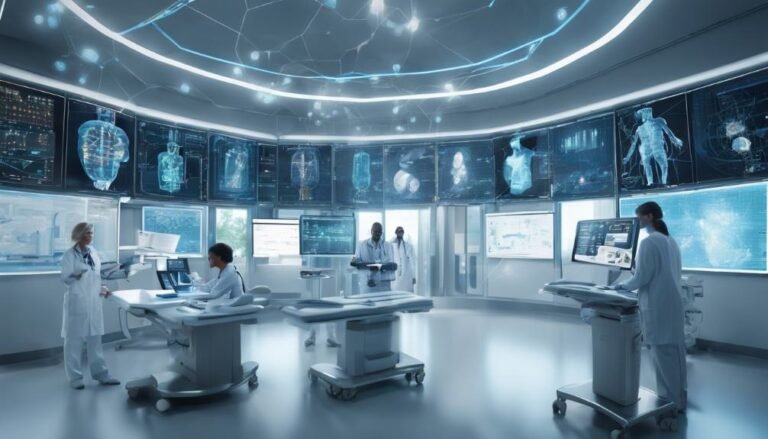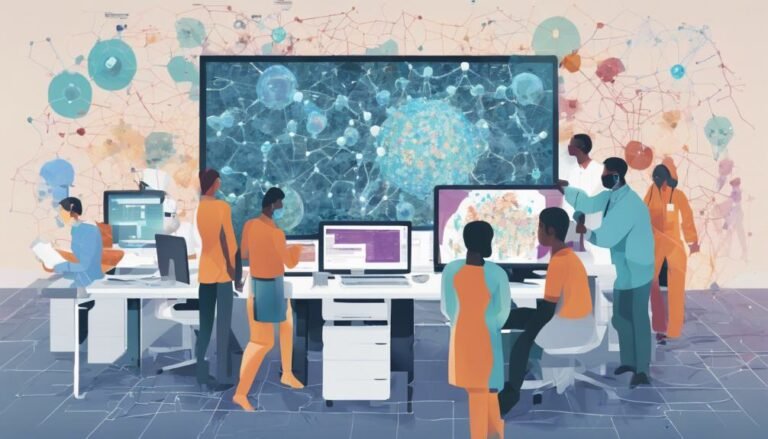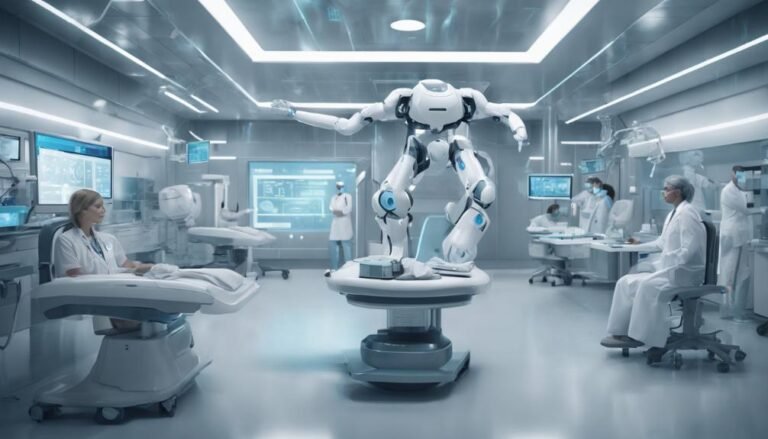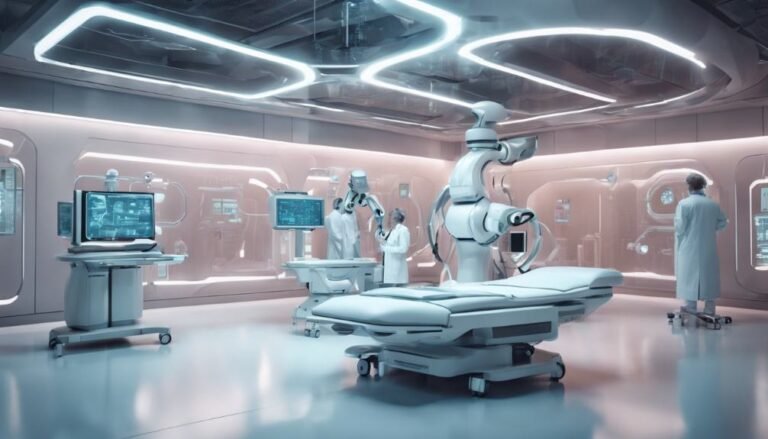AI for Smart Hospitals
In the domain of modern healthcare, AI's integration into smart hospitals has revolutionized patient care and operational efficiency. Imagine a future where AI not only streamlines resource management but also personalizes treatment plans based on real-time data insights. The potential for AI in smart hospitals goes beyond optimizing processes; it holds promise in transforming how healthcare is delivered. As we explore the intricate connections between AI and healthcare, the possibilities of enhanced patient outcomes and innovative care approaches beckon for further exploration into this evolving landscape.
Key Takeaways
- AI optimizes resource management in smart hospitals.
- Predictive analytics forecast patient diagnoses and treatment responses.
- Enhances staff scheduling processes using historical data.
- Real-time patient data improves healthcare delivery.
- AI-powered tools streamline operational tasks.
Evolution of Healthcare Technology
The evolution of healthcare technology has revolutionized the way medical professionals deliver care and manage patient information. Healthcare digitization, along with the impact of wearables, has greatly transformed the medical landscape.
Healthcare digitization encompasses the shift from traditional paper-based systems to electronic health records (EHRs) and digital communication platforms. This change has streamlined processes, improved data accuracy, and enhanced communication among healthcare providers. With EHRs, patient information is easily accessible, allowing for more efficient and coordinated care.
The impact of wearables, such as smartwatches and fitness trackers, has empowered individuals to take charge of their health. These devices can track key signs, activity levels, and even detect potential health issues. By integrating wearable technology with healthcare systems, medical professionals can gather real-time data, monitor patients remotely, and provide personalized care plans.
AI Applications in Patient Care
AI-driven technologies are transforming patient care practices in modern healthcare settings. AI in telemedicine is revolutionizing how patients receive medical attention remotely. Virtual patient consultations powered by AI allow healthcare providers to offer real-time assistance, diagnosis, and treatment recommendations without the need for in-person visits.
These AI applications enhance patient care by providing convenient access to healthcare professionals, especially for individuals in remote locations or with mobility issues. Through telemedicine, patients can schedule virtual appointments, discuss their symptoms, and receive medical advice from the comfort of their homes. AI algorithms analyze patient data, such as medical history and symptoms, to assist healthcare providers in making accurate diagnoses and personalized treatment plans.
Moreover, virtual consultations powered by AI improve efficiency in patient care delivery, reducing wait times, and increasing accessibility to healthcare services. By leveraging AI technologies in telemedicine and virtual consultations, healthcare facilities can enhance patient outcomes and provide quality care to a broader population.
Optimizing Hospital Operations With AI
To streamline hospital operations effectively, consider the implementation of AI-driven solutions that optimize resource management and enhance overall efficiency. AI implementation in hospitals can lead to significant cost-saving measures by automating tasks such as inventory management, staff scheduling, and equipment maintenance. By utilizing AI algorithms to analyze historical data and predict future needs, hospitals can prevent overstocking or understocking of supplies, ultimately reducing unnecessary expenses.
Furthermore, AI integration can play a pivotal role in improving patient satisfaction levels. Through personalized care plans generated by AI algorithms based on individual patient data, hospitals can deliver more tailored and efficient treatment experiences.
Additionally, AI-powered chatbots can provide quick responses to patient inquiries, reducing wait times and enhancing communication between patients and healthcare providers.
Improved Diagnosis and Treatment
When AI is integrated into hospital systems, it can greatly enhance diagnostic accuracy by analyzing vast amounts of patient data with speed and precision.
This technology also enables the personalization of treatments based on individual patient characteristics, leading to more effective and targeted medical interventions.
Diagnostic Accuracy Enhancement
In addition, thorough AI technologies can greatly enhance the precision of medical diagnoses and subsequent treatment plans in smart hospitals. Machine learning algorithms, coupled with advanced pattern recognition capabilities, play a pivotal role in augmenting clinical decision-making processes. By analyzing vast amounts of patient data, AI systems can identify subtle patterns and trends that may escape human observation, leading to more accurate and timely diagnoses.
The integration of AI in clinical decision-making empowers healthcare professionals with valuable insights and recommendations based on data-driven analysis. These AI-driven tools can assist in identifying complex relationships within patient data, facilitating a more detailed understanding of individual cases.
Furthermore, AI integration enables real-time monitoring and analysis, allowing for proactive interventions and personalized treatment plans tailored to each patient's unique needs.
In smart hospitals, the synergy between AI technologies and healthcare providers enhances diagnostic accuracy, ultimately improving patient outcomes and optimizing resource utilization. The continuous refinement of AI algorithms through iterative learning further enhances the capabilities of these systems, setting new standards for precision in medical diagnosis and treatment planning.
Treatment Personalization Options
Utilizing advanced AI technologies offers personalized treatment options that greatly enhance the precision of both diagnosis and subsequent medical interventions in smart hospitals. Treatment customization enables healthcare providers to tailor therapies to individual patient needs, improving outcomes and reducing the risk of adverse effects. By integrating vast amounts of patient data, AI systems can analyze information quickly and accurately, helping to identify the most effective treatment strategies for each specific case.
Patient engagement is another vital aspect of treatment personalization in smart hospitals. AI tools can empower patients by providing them with detailed insights into their conditions and treatment options, fostering collaboration between patients and healthcare professionals. This collaborative approach enhances treatment adherence and overall patient satisfaction, leading to better long-term health outcomes.
Personalized therapies, driven by AI algorithms, can revolutionize the way medical interventions are designed and implemented, moving healthcare towards a more patient-centric model. Through data integration and continuous learning, AI for treatment personalization holds the potential to transform the healthcare landscape, offering tailored solutions that prioritize individual patient needs and preferences.
Streamlined Patient Care
Enhancing patient care efficiency through the integration of AI technologies is paramount in achieving improved diagnosis and treatment outcomes in smart hospitals. By utilizing AI-driven remote monitoring systems, healthcare providers can continuously track patient data in real-time, enabling proactive interventions and personalized treatment plans.
These systems analyze extensive patient information, detecting subtle changes that may indicate worsening conditions or the need for immediate attention.
Moreover, AI-powered communication tools streamline the exchange of information among medical staff, leading to quicker decision-making processes and enhanced collaboration. With thorough integration of AI into patient care workflows, healthcare professionals can access detailed patient histories, diagnostic reports, and treatment guidelines instantly, optimizing the accuracy and speed of diagnosis and treatment.
In essence, the implementation of AI technologies in smart hospitals revolutionizes patient care by facilitating remote monitoring and enhancing communication channels. This streamlined approach not only improves the quality of care but also increases overall operational efficiency, ultimately benefiting both patients and healthcare providers.
Enhancing Staff Efficiency
How can artificial intelligence streamline operational tasks to boost staff efficiency within smart hospitals?
AI offers a multitude of solutions aimed at enhancing staff efficiency, ultimately leading to increased staff satisfaction and optimized workflow processes. By implementing AI-powered tools such as predictive analytics, smart scheduling systems, and virtual assistants, hospitals can greatly reduce the time spent on administrative tasks.
For instance, AI can predict patient admission rates, allowing staff to prepare adequately, thereby streamlining the admission process. Smart scheduling systems can optimize staff schedules based on patient influx, ensuring adequate coverage without unnecessary overtime. Virtual assistants can handle routine inquiries, freeing up staff to focus on more critical tasks, improving overall workflow efficiency.
These AI-driven solutions not only enhance staff productivity but also contribute to a more positive work environment, ultimately boosting staff satisfaction levels within smart hospitals. Embracing AI technology for staff efficiency is essential in ensuring hospitals operate smoothly while maintaining high-quality patient care standards.
AI-Driven Resource Management
Artificial intelligence plays a crucial role in optimizing resource management within smart hospitals. AI-driven resource management encompasses two key aspects: staff scheduling and resource allocation.
By leveraging AI algorithms, hospitals can enhance staff scheduling processes by analyzing historical data on patient influx, acuity levels, and staff performance to create efficient schedules that align with patient needs. This not only guarantees adequate coverage but also minimizes burnout by distributing workload effectively.
Moreover, AI aids in resource allocation by predicting patient admissions, optimizing bed utilization, and managing medical equipment inventory. Through real-time data analysis, AI can forecast patient demand, allowing hospitals to adjust staffing levels and resource distribution accordingly.
This proactive approach improves patient care by reducing wait times and enhancing operational efficiency.
Smart Monitoring Systems
You'll explore the integration of real-time patient data and predictive health analytics within smart monitoring systems in hospitals. These systems enable healthcare providers to track patient essential signs continuously and anticipate potential health issues before they escalate.
Real-Time Patient Data
Real-time patient data, obtained through smart monitoring systems, plays a crucial role in enhancing the efficiency and effectiveness of healthcare delivery in smart hospitals. Remote monitoring technologies allow healthcare providers to continuously track patients' essential signs, medication adherence, and overall health status in real-time. This constant stream of data enables healthcare teams to intervene promptly when abnormalities are detected, leading to improved patient outcomes and reduced hospital readmissions.
Data analytics further enhances the value of real-time patient data by enabling healthcare providers to identify patterns, trends, and anomalies that might go unnoticed through manual review. By leveraging advanced analytics tools, healthcare professionals can gain valuable insights into patient health trajectories, predict potential complications, and tailor treatment plans to individual patient needs.
In smart hospitals, the integration of real-time patient data with remote monitoring and data analytics creates a holistic ecosystem that supports proactive, personalized care delivery. This synergy not only improves patient outcomes but also enhances operational efficiency by optimizing resource utilization and streamlining clinical workflows.
Predictive Health Analytics
Through the utilization of predictive health analytics within smart monitoring systems, healthcare providers can proactively identify potential health issues and personalize treatment strategies for patients. Remote monitoring plays an essential role in this process, allowing continuous tracking of vital signs and health parameters.
By leveraging data-driven insights, healthcare professionals can detect early warning signs of deteriorating health and intervene promptly. This approach aligns with the principles of preventative healthcare, focusing on predicting and preventing health problems before they escalate.
Predictive health analytics enable the delivery of personalized medicine, tailoring treatment plans to individual patients based on their unique health data. This targeted approach enhances the effectiveness of interventions, improving patient outcomes and overall quality of care.
Security and Privacy Considerations
Considering the increasing integration of AI technology in healthcare settings, it's imperative to address the critical security and privacy considerations in smart hospitals. Data encryption plays a pivotal role in safeguarding sensitive patient information from unauthorized access. By encrypting data at rest and in transit, hospitals can guarantee that even if a breach occurs, the information remains secure and unreadable to malicious actors.
Access control is another essential aspect to regulate who can view or manipulate patient data. Implementing strict access control measures ensures that only authorized personnel can access specific information, reducing the risk of data breaches.
Furthermore, ensuring that AI algorithms comply with data privacy regulations such as GDPR and HIPAA is crucial in maintaining patient trust and confidentiality. Hospitals must prioritize the protection of patient data by regularly updating security protocols and conducting thorough risk assessments to identify and mitigate potential vulnerabilities.
Future Trends in AI for Hospitals
An emerging trend in AI for hospitals is the utilization of predictive analytics to enhance patient outcomes and optimize healthcare delivery. Predictive analytics leverages AI algorithms to forecast patient diagnoses, treatment responses, and potential complications, enabling healthcare providers to manage proactively and tailor personalized care plans.
However, this advancement raises ethical implications regarding patient privacy, data security, and the responsible use of AI-generated insights. Regulatory challenges also arise concerning the oversight of AI systems in healthcare, ensuring compliance with data protection laws and maintaining transparency in decision-making processes.
Looking towards the future, the implications of integrating AI further into hospital operations are vast. From streamlining administrative tasks to enabling more accurate diagnostics and treatment recommendations, AI has the potential to revolutionize healthcare delivery.
Technology integration will be essential in harnessing the full benefits of AI, requiring seamless interoperability between different systems and devices to guarantee data accuracy and accessibility across the healthcare ecosystem. As AI continues to evolve, addressing these ethical and regulatory considerations while maximizing its potential will be vital for shaping the future of smart hospitals.
Real-world Success Stories
Real-world hospitals have demonstrated remarkable success in implementing AI technologies to enhance patient care and operational efficiency. These success stories showcase the transformative power of technological innovation in the healthcare industry. By leveraging AI-driven solutions, hospitals haven't only improved patient outcomes but also realized significant cost-saving benefits.
One notable success story involves the use of AI-powered predictive analytics to streamline hospital operations. By analyzing vast amounts of data in real-time, AI algorithms can forecast patient admission rates, optimize staff schedules, and allocate resources more efficiently. This proactive approach not only enhances patient care by ensuring timely interventions but also reduces operational costs by minimizing unnecessary expenses.
Additionally, AI applications in diagnostics have revolutionized medical imaging interpretation. Advanced algorithms can detect subtle abnormalities that may be missed by human eyes, leading to earlier disease detection and improved treatment outcomes.
Conclusion
In summary, with AI revolutionizing the healthcare industry, smart hospitals are paving the way for a more efficient and patient-centric approach to healthcare delivery.
By optimizing resource management, enhancing patient care, and improving operational efficiency, AI is transforming traditional hospitals into cutting-edge facilities.
However, as we navigate the complexities of AI integration in healthcare, it's essential to address security and privacy concerns to guarantee the ethical and responsible use of these advanced technologies.







